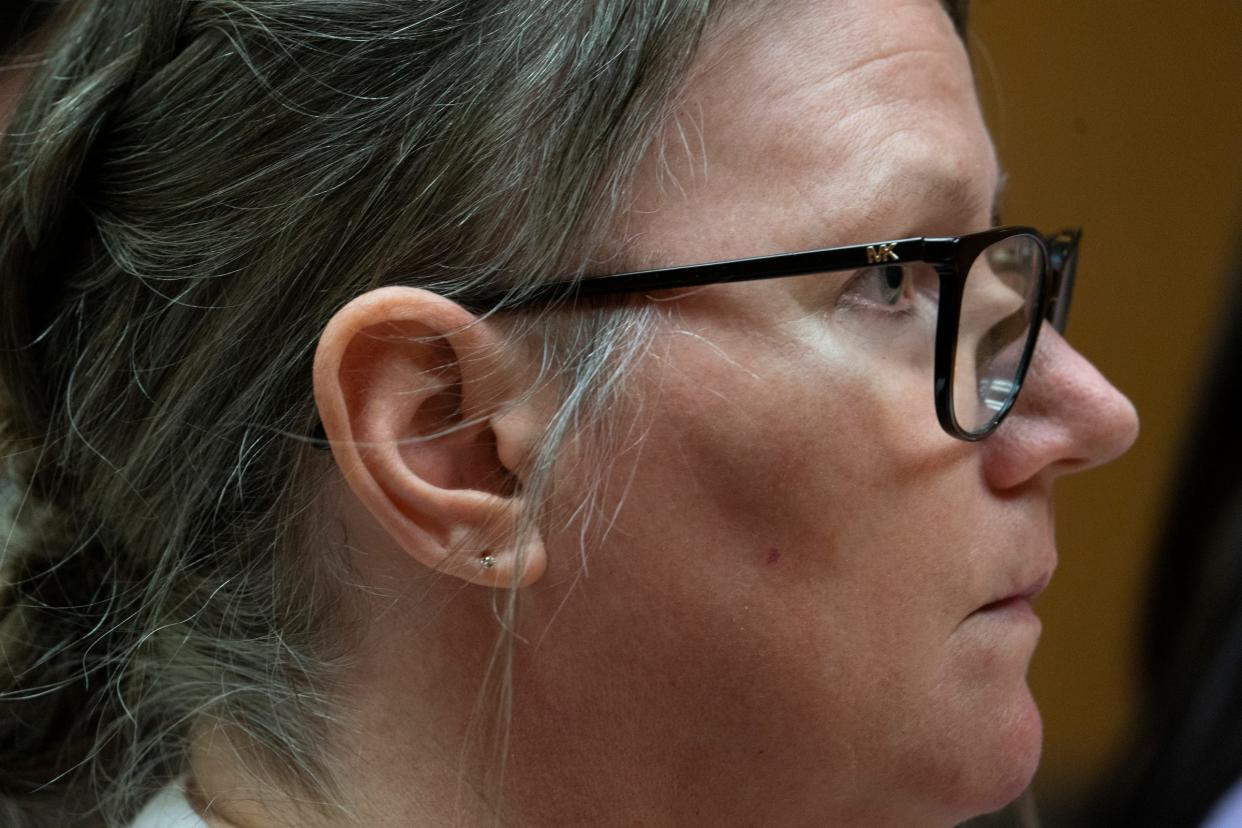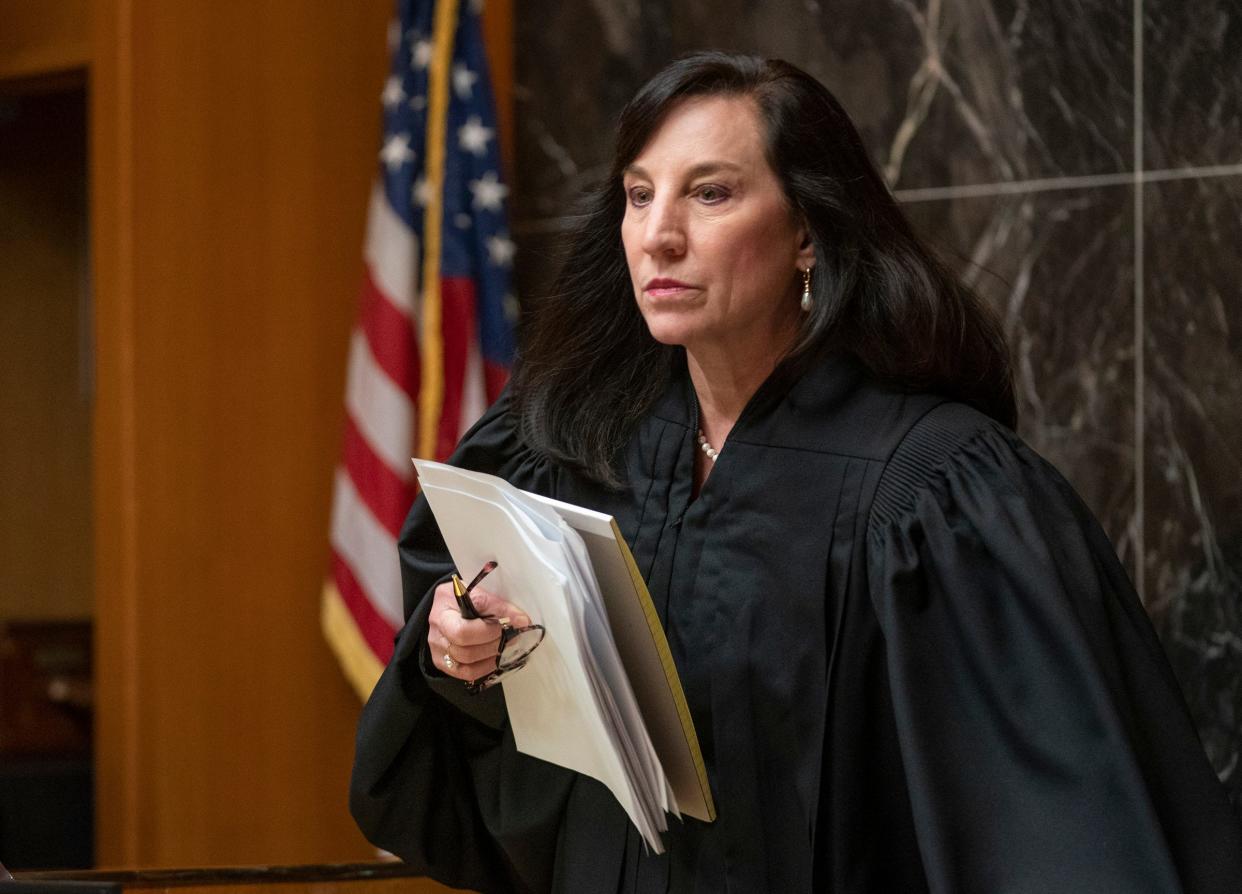Jennifer Crumbley's jury includes several gun owners, mostly women
After two full days of heated questioning, a jury was seated Wednesday in the historic case of Jennifer Crumbley, the first parent in America to be charged and tried in a mass school shooting.
The panel of 12 jurors and five alternates includes 10 women and seven men, most of them parents, including multiple gun owners and hunters, who will be tasked with determining whether Crumbley is responsible for the deaths of four students killed by her son in the 2021 Oxford High School shooting.
The trial resumes at 8:30 a.m. Thursday, with both sides delivering their opening statements to the jury.
The jurors include:
Juror 1: White female. Works in human resources. Has two adult children. Her father was a hunter. “I gave up watching all the news in all forms six years ago. I’m pretty uninformed.” Regarding her father’s guns, “I know my dad’s guns were always locked. It was not for the children.”
Juror 2: White, 26-year-old married male. Says he grew up in a strict, Christian home. He works in sales for the mortgage industry. He took hunter safety classes when he was 16, but is not an avid hunter. His father has a gun and has a concealed-carry permit. The juror said he doesn’t have strong opinions on guns. He doesn’t have cable TV, tries to stay away from social media and despises TikTok.
Juror 3: White female hair stylist, says she’s familiar with the case, has no issues with guns and can be impartial.
Juror 4: White female engineer, husband is a lawyer. She said she can be fair and impartial and that “it’s not a good-bad parent decision” the jury will be making in this case, stating: “That’s not why we’re here.” She did note, however, that she no longer goes to movie theaters or shopping malls following a mass shooting in Colorado that shook her sense of security.
Juror 5: White female, married. Has guns in the house and says they “are locked up.” She has two grown children and recalls taking gun safety classes as a family when the kids were in elementary school. She works for a bank and her husband is in advertising. “I feel like I can be fair,” she said.
Juror 6: White female. Married and retired compliance specialist. Her husband is a retired meat market owner and her daughter a special education teacher. She was on a jury many years ago, but remembers little to nothing about the case.
Juror 7: White male doctor who said, “I’ve seen a lot of gun violence.” Owns multiple guns that he stores in a safe. He calls himself a “very strong proponent” of the Second Amendment and goes to shooting ranges about once a month, maybe every two months. He has lost two loved ones to suicide by a gun.
Juror 8: White male. Automotive engineer with twin teenagers. He has a collector’s gun that belonged to a relative who served in a war. He remembers being a kid and learning how to shoot a shotgun, though he is not into guns as an adult, beyond owning his collector’s item.
Juror 9: White female. First-grade teacher, married with two grown children and one older teenager. “I don’t have guns, but I understand that it’s legal,” she said.
Juror 10: White male, works in vehicle logistics. He owns several guns and remembers tagging along with his dad to gun ranges when he was 10. His best friend is a police officer in a jail and his girlfriend is a personal trainer.
Juror 11: Single white female. No children. She has a gun for personal protection, worked 16 years as a police officer for a university. Now she handles parking tickets.
Juror 12: Black male, Single. No children. Works as a manager in sales. His father had a gun and taught him about gun safety.
Juror 13: Single white male who works as a powertrain engineer. He doesn’t own any guns, but went to a shooting range with his girlfriend over the last year for fun. He grew up in Nebraska. He says his engineering brain makes him a good juror as he will be able to carefully analyze evidence as it applies to the charges. Defense attorney Shannon Smith joked with him that “We don’t let engineers sit on juries” because they typically see the world in black and white. “But there’s a lot of gray space in this case,” Smith said. The juror said he understood and that he could be fair.
Juror 14: White male parole officer who says he’s “fair to a fault” and sees “success stories” in his work involving prisoners who turn their lives around. He’s married, has two older teenagers. Has guns at home, keeps them in a storage unit. His kids are not interested in guns. Before his 20-year career in law enforcement, he worked for the government’s Medicaid and food atamp programs.
Juror 15: Single white female who works as an account manager for rental properties. Lives with her parents.
Juror 16: White married female with an infant son. Works in billing for university students. She is originally from the Upper Peninsula and used to be a hunter. She remembers getting days off from school as a kid during hunting season, but she no longer hunts. Her sister was a target of a school shooting that was stopped.
Juror 17: White female, married with two school-age children and works in veterinary medicine. “When I think about this case, I feel rage,” she said of the Oxford shooting. She grew up with guns. Her dad hunted and her sister is a competitive shooter, though she said her husband is “very anti-guns” and “just doesn’t want them in our house.”

All 17 jurors selected will sit in on the trial — though five alternates will be dismissed before the jury goes into deliberations. The alternates will not be known until that happens, which is designed to make sure all jurors pay attention to the case.
'We’re not deciding if someone is a bad parent'
Crumbley and her husband, James, who goes to trial in March, are charged with involuntary manslaughter for buying their son the gun that he used in the 2021 Oxford High School shooting that left four people dead and injured six other students and a teacher.
Ethan Crumbley pleaded guilty and has been sentenced to life in prison without the possibility of parole, though his new attorneys have appealed the sentence.
Prosecutors are seeking to hold the parents responsible for the deaths of Hana St. Juliana, 14; Tate Myre, 16; Madisyn Baldwin, 17, and Justin Shilling, 17.
Though Oakland County Circuit Judge Cheryl Matthews stressed to jurors, “We’re not deciding if someone is a bad parent,” questioning focused heavily on parenting Wednesday, especially from the defense.

Crumbley’s lawyer Smith focused questions to prospective jurors that touched on key themes in the mother’s case, such as: their son was often left home alone; he hid his obsession with violence from his parents, like keeping a bird’s head under his bed in a jar or writing in a journal about how he was going to shoot up his school; and texting friends about his mental health, and how he was going to tell his parents “about the voices.” He went to a shooting range with his mom at 15.
The Crumbleys have long maintained that they didn’t know about the journal, the texts or the birds their son mutilated, that they safely secured the gun at issue, and that going to the shooting range was a family hobby.
Prosecutors have argued that the parents knew their son needed mental health treatment but instead bought him the gun used in the shooting on Nov. 30, 2021, as an early Christmas present.
Smith asked these questions of the jurors:
Do you think kids should never be around a gun, or would you allow it in some circumstances?
Is it OK to leave a teenager or a 10-year-old home alone?
Should parents go through their teenager’s text messages, room, emails?
Do you think parents should know everything their children do, and, if their kids mess up, should the parent be held responsible?
Do you think your children would be able to hide something from you?
That last question elicited an emotional and candid response from a male juror, who talked about how he and his wife didn’t know their son was researching how to commit suicide on the internet after the drowning death of his friend. Someone at school noticed the boy’s behavior was changing and contacted the parents, who eventually found out their son was depressed and contemplating suicide.
Another juror — a mother with two children — talked about how her daughter was using social media “as a personal diary to the world” until her mother finally looked at her account and discovered the activity. “I just didn’t believe she could be that careless,” the juror said, adding she now checks her daughter’s social media every day. “They know how to get around you.”
That's precisely what the defense has argued in the parents' cases: That their son did things they didn't know. Perhaps most notably, the defense says, they had no idea he was plotting to shoot up his school.
Contact Tresa Baldas: tbaldas@freepress.com
This article originally appeared on Detroit Free Press: Jury selected in Jennifer Crumbley involuntary manslaughter trial
